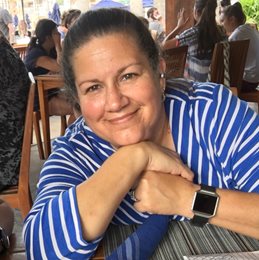Florida Teacher's Students Learn to Embrace the Unknown
Angela Chambers |
April 21, 2020

The engineering building at Gina Ruiz-Houston’s college only had women’s bathrooms on every other floor. She also joined a friend’s research project at sea because they needed another female on the ship.
The Advanced Placement® Physics teacher at Barbara Goleman Senior High in Miami Lakes, Florida, knows firsthand why it’s important to expose girls to a STEM education. That’s why she organized the first Girls Who Code group at the high school. She invites middle schoolers – including her daughter – and freshman and sophomores to join, knowing the importance of starting to learn this skill early.
“If we can light that fire when they’re young, rather than during the pressures of junior and senior year, then they have the time to make mistakes and learn from it,” says Ruiz-Houston, who has been teaching for 23 years.
As NMSI’s April Teacher of the Month, Ruiz-Houston learns coding alongside girls in the group, going through the challenges and struggles with the team. “On the first day of coding, we couldn’t find the run button,” she says. “Now, the girls have operated a robot and created a website. They’ve grown so much.”
Before becoming a teacher, Ruiz-Houston worked on legislation that would protect manatees from boating accidents. The Florida legislature passed the bill, and since then, the manatee population has stabilized and is no longer plummeting.

Experienced Distant Learning
Several years ago, Ruiz-Houston offered a physics distance learning class. She learned how to video tape and broadcast. “I never thought I’d be using this skill again,” she says.
Thanks to this knowledge, the transition to online learning that teachers across the country are experiencing has been easier for her. She lectures every day to her students via Zoom and uses a projection camera to show how she is working through problems. But rather than getting overwhelmed by the technology, Ruiz-Houston advises teachers to start with something that’s comfortable for them.
“Teachers may want to write out examples, take a picture and send it to the kids,” she says. “Give students the best you can give. If you’re uncomfortable in front of the camera, find other video clips to show.”
For biology classes, Ruiz-Houston recommends the Amoeba Sisters video series as one of many different educational options available to share with students. She says to learn one new platform at a time, and once it’s mastered, try the next little thing. Ruiz-Houston’s new skill she’s developing now is becoming familiar with Microsoft Teams – utilizing video tutorials to teach herself the platform. With the revised AP® exams requiring students to upload answers in five minutes, students are practicing sharing their answers in this timeframe with Ruiz-Houston on Teams.
She also is using the Remind phone app and sends out about 10 messages a day. “My kids are probably sick of me,” she says.
Embracing the Unknown
During NMSI online student supports, where expert coaches provide a time to study and review content for the AP exam, Ruiz-Houston will view what her students are doing while simultaneously texting them in Remind.
“I go into the [NMSI supports] online and see my kids answering questions,” she says. “I think, ‘That’s my babies. Look at them go.’”
Ruiz-Houston says the NMSI online student supports have “helped tremendously. They present a normal human being in a normal situation bringing normal to a drastic situation we’re having right now.”
During this time of remote learning, Ruiz-Houston finds ways to authentically connect with students. For her birthday, she tried on a bunch of different hats during a class on Zoom. “It’s the little things that make us people and let us know we’re not alone,” she says. “I try to be me in front of them to bring peace and normality.”
Last summer, Ruiz-Houston attended NMSI’s College Readiness Program physics session, and says the presenter was “excellent with a capital E.” She says this presenter told her about Girls Who Code and provided great resources to use in class.
While the world is experiencing a lot of unknowns, Ruiz-Houston always wants to teach her students to learn how to deal with things that they don’t know exist. She gives the example of the Apollo 13 mission needing to fit a square peg into a round hole to bring the astronauts safely back to Earth.
“Stop telling me can’t – let’s try to figure out the way to make it happen,” she says. “That’s what I want to teach my children.”
Mentioning NMSI’s philosophy to give all students an opportunity to take advanced courses, Ruiz-Houston says it’s “beautiful NMSI is trying to help the kids who didn’t consider themselves as important enough to be scientists. Those are the people who change the world because it was hard for them, and they persevered.”
Know a NMSI-connected teacher who deserves recognition? Email marketing@nms.org to tell us how they’re making a difference in math, science, English and arts education.